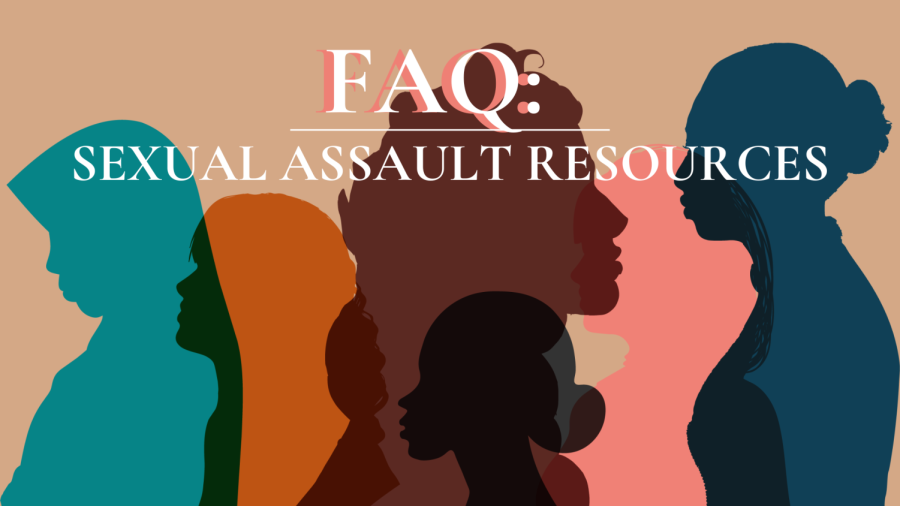FAQ: What to know about Sac State’s sexual assault services
In light of the recent incidents of sexual assaults this semester, The State Hornet has a FAQ to answer questions about what services are available to students on-campus, including services from WEAVE. Since September, there have been multiple sexual assaults on and off campus. (Graphic made in Canva by Justine Chahal.)
November 18, 2022
In light of the several sexual assaults have occurred on and near Sac State, the State Hornet complied this FAQ with resources for students on campus.
Question: What services or programs exist at Sac State for victims and survivors of sexual assault?
Answer: Both the When Everyone Acts Violence Ends center and the Title IX office provides services for students experiencing sexual assault.
WEAVE is a crisis intervention service where students can speak to a confidential advocate about their experience and report instances of assault. Lauren Swartzen, CSU Confidential Campus Advocate at WEAVE, said she provides access to other resources, including assistance with academics and health care.
The Office of Equal Opportunity’s Title IX department handles reports of sexual misconduct, according to the Sac State website. Through OEO, students can report an incident and learn more about the procedure.
Q: How does a student file a report of sexual assault or harassment?
A: As a first step, students can contact WEAVE to discuss how the process of filing a report works. Swartzen said reporting an assault can be a many-layered process with heavy jargon, so she tries to assist students to become familiar with their rights and options.
Students can then file a report through OEO. According to the university’s Title IX page, both students and faculty can file a report by completing a formal complaint form.
The form asks for basic information, including a way to contact the complainant. The form will ask for information about the date of the incident, persons involved and any supporting evidence if applicable.
Swartzen said students can report an incident at any time, regardless of how long ago the assault was.
“There is no time limit on when you can report and often we see people reporting weeks, months, years after because it varies for every person,” Swartzen said.
Swartzen said there is not a single way to report sexual assault; it depends on the incident.
“Every one person is different,” Swartzen said. “Trauma will look differently, but I encourage them to always know that they can come and see me as the advocate. We can talk through it so they can kind of get the feel of what works best for them.”
It is important to note if students do make a report later, the ability to gather evidence can be limited, according to the Victims Rights and Options guide.
Q: What can students do in the case of an emergency?
A: In the event of an emergency, students can contact either local law enforcement or campus police. University police can be contacted at (916) 278-6000.
The emergency blue light call boxes can be found across campus. The Victims Rights and Options guide said university police can escort students to a safe place like a hospital or sexual assault response center.
The Victims Rights and Options guide recommends students in this situation preserve any evidence they may have by not cleaning up afterward or disposing of clothes.
Q: What happens after a student files a report?
A: A OEO member will meet with the student and explain the process of pursuing a complaint. Students are able to bring another person to support them during the meeting, according to the Title IX page.
According to OEO, not all reported incidents will lead to a formal process -based on certain factors like what the victim wants and if the incident is a safety concern for the campus.
An investigator will speak to the person reporting the incident, while a representative also speaks to the accused person. Depending on the case, there could be a live hearing.
Q: What if a victim does not feel comfortable reporting the incident?
A: Students can use services available through WEAVE, even if they do not want to issue a report, according to Swartzen. She added she is not a mandated reporter, so any information given to her about an incident will not be reported if a student does not want it to be.
“I’m not trying to push anything on students,” Swartzen said. “I really want them to feel really empowered by the information that they hear and be able to choose what works best for them.”
Q: What services are available to assist a victim’s physical and mental health?
A: Student Health and Counseling Services at The WELL can assist with a student’s physical and mental health, according to Swartzen. Students are able to participate in group and individual counseling.
According to Title IX, students can receive medical care even if they do not report the incident. An advocate can refer students to counseling and attend the first meeting with them.
Q: What services are available to assist a victim academically?
A: Swartzen said as an advocate, she can assist students academically.
“I can work with professors to make sure that students are academically strong, making sure that no one gets behind, because of the sexual assault,” Swartzen said.
According to the Victims Rights and Options guide, students can have adjustments made to their course schedule, classwork and exams.
Q: What protection services are available for students?
A: For students who do not feel safe walking around campus — especially in the dark — the Hornet Safety Escort system exists to escort them to and from locations such as parking lots.
The escort system can be reached by phone at (916) 278-7260. According to Sac State’s site, a dispatcher will obtain the student’s location and provide an estimated arrival time.
There will either be a car, cart or Community Service Officer that arrives at the location.
Swartzen said the escort system could be improved, especially for students who feel uncomfortable being escorted by campus police.
“That might not be the best option for some or even an option if so many people are requesting that,” Swartzen said.“I think that’s an area of improvement that we need to see happening to really make students feel safer at night.”
Q: How can somebody support a victim who is currently experiencing these issues?
A: Swartzen said that people should be equipped with resources and emphasized the importance of thanking victims for sharing their experiences.
Swartzen added that students should be referred to professionals who can assist in these situations, like Swartzen, who is a peer health educator. She said it can also help victims to ask how they can be supported at that time.
Q: How can students reach someone for assistance?
A: WEAVE can be contacted via phone at (916) 278-5850 and email via [email protected]. To speak to an advocate after hours and over the weekend, WEAVE’s 24-hour hotline is (916) 920-2952.
Swartzen said a new advocate is due to be added in January. Since she is currently the only Confidential Advocate, she said she prefers to be contacted via email or phone but welcomes students to drop-in at the Student Health & Counseling Services at The WELL.
OEO can be contacted at (916) 278-5770 as well as via email at [email protected]. Their Title IX office is located in Room 2005 at Del Norte Hall.
































































































































